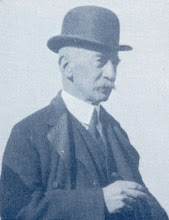Pronounced shuh-NEE-bull, this is a fascinating word I stumbled upon while in the midst of thrilling research into the history of the United States Postal Service. It would seem that in 1904, a small, ragged army of put-upon coal miners executed a coup of sorts in the Wisconsin village of Shaniebuhl. (Do not bother looking for it on a map. There is no way of knowing if it still exists, much less if it's still in Wisconsin.) Their intentions were egalitarian, their methods Soviet, their success, apparently, absolute.
By all accounts formerly an unassuming town off the beaten path and most likely destined for disintegration from the cold shoulder of the railroads, Shaniebuhl became a magnet for America's disaffected and disenfranchised laborers. In droves they shambled to the sparse Midwestern nowhere, buoyed by their hopes of the life unyoked, coal-blackened men and their teams of unlettered children and their wives with tired shoulders, strained backs and exhausted breasts, proud people all, and all submitted to the dream of a fair shake.
Emboldened, Shaniebuhl seceded from the United States and became a sovereign nation. The United States hardly noticed.
In Amish communities, when someone renounces the faith and leaves for less restricting pastures, their names are forbidden to be spoken. So it was with Shaniebuhl. Its name and address was erased from the continental 48. They were assiduously omitted from the census of 1910. Surrounding municipalities were surprised to find their jurisdictions suddenly bordered not by Shaniebuhl's slight territorial reach, but as if by nameless void. When the Eisenhower Interstate Highway System begridded the nation four decades later, a not unsizable portion of Wisconsin was intentionally exempted from coverage.
The practical implication to the larger world was that, short of traveling there, (if they could even find it), kith and kin of Shaniebuhl residents had no way of contacting them. Their letters were all returned as undeliverable. The interior Postal vernacular quickly adopted the word "shaniebuhl" to indicate a town that has no official existence.
A peculiar footnote to this tale is that the number of shaniebuhls documented by Postal historians has greatly increased over time, with exceptional proliferations at certain moments in the nation's history. Conscription, for instance, is a sure way to geometrically multiply formally nonexistent communities strewn invisibly throughout America. Imagine this land! these constellations of islands, unabsorbed, endowed by cowards, lying we know not where in our very midst!
9.7.09
Subscribe to:
Post Comments (Atom)















No comments:
Post a Comment